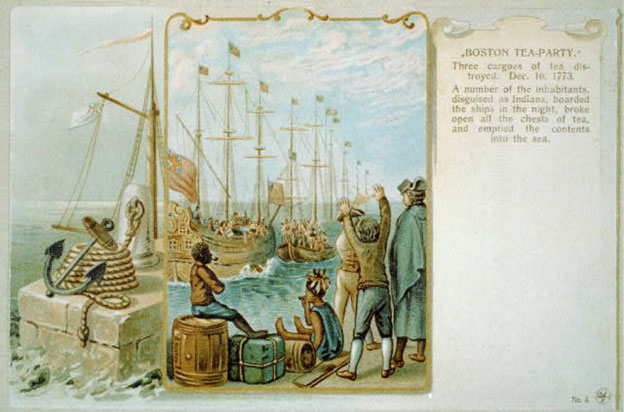Although the American Revolution involved many bloody battles between the British army and the American colonists, many of the issues that caused the war started long before the two began fighting. Several political issues that had been brewing for a while fueled the conflict.
Since the establishment of the American colonies in Jamestown, Virginia, in 1607, the colonists had little say in the governing of the 13 colonies. Initially, Great Britain had little involvement in the business of the colonies. However, as the colonies started to grow and become profitable for Great Britain, the British Parliament started to implement measures to control trade and the lives of those in the colonies.
One measure of control was the lack of representation of the colonists in Parliament. The British government did not allow the colonists to have a representative in Parliament, but it allowed the colonists to have colonial assemblies where they were able to elect representatives to vote for laws and taxes within each of the 13 colonies. As Parliament continued to levy taxes and restrict more freedoms of the colonists without proper colonial representation, tension grew between the two.
Another political issue that led to the American Revolution came at the end of an important war, the French and Indian War. This war was a battle between Great Britain and France (later assisted by American Indians) in North America. As part of the Proclamation of 1763, the British agreed to keep the colonists from expanding beyond the Appalachian Mountains. The war was officially brought to an end by the Treaty of Paris in 1763. The treaty increased British dominance in North America by giving Great Britain territory formerly owned by the French east of the Mississippi River. Thus, the English would increase its dominance in North America. Colonists expected this to be an opportunity to move past the established borders of the colonies.
The British had another idea in mind. As part of the Proclamation of 1763, the British agreed to keep the colonists from expanding into any lands west of the heads of all rivers, which flowed into the Atlantic Ocean from the west or northwest. This eased the fears of American Indians while increasing tension between the American colonists and the British government.
![]() Click on the map below to see the geographical boundaries of the Proclamation of 1763.
Click on the map below to see the geographical boundaries of the Proclamation of 1763.
Source: Map, New France, Wikimedia
Why do you think the creation of the Proclamation Line of 1763 caused tensions to increase between the American colonists and the British government? Respond in your notes.
Interactive popup. Assistance may be required.
The American colonists believed that the Proclamation Line of 1763 was used to keep the colonies from expanding, further limiting the rights of the colonists.

Source: Boston Tea Party, Library of Congress
Are you familiar with the scene above? It is an artist's depiction of the Boston Tea Party, one of the most important events leading up to the American Revolution. Click on the link below to watch a video about this historic event, and then answer the questions that follow.
![]() The Sons of Liberty and the Boston Tea Party
The Sons of Liberty and the Boston Tea Party
What were the people who participated in the Boston Tea Party protesting?
Interactive popup. Assistance may be required.
The colonists were protesting the Tea Act, which forced the colonists to purchase tea solely from a British company.
How did the British government respond to the Boston Tea Party?
Interactive popup. Assistance may be required.
In retaliation for the Boston Tea Party, the British government closed the Boston Harbor and began strongly enforcing existing laws limiting the rights of the colonists.
![]() Click below to learn more about the Intolerable Acts (Coercive Acts).
Click below to learn more about the Intolerable Acts (Coercive Acts).

In response to the Boston Tea Party and other protests by colonists, the British government enacted a series of laws that further divided the American colonists and the British government. These acts were named the Intolerable Acts.

This act required colonists to provide housing (quarters) for British troops stationed in the colonies.

This bill closed the port of Boston to any trade until the colonists repaid the British government for the damages caused by the Boston Tea Party.

This act prevented British officials from being tried in the courts of the colonies for any capital crimes committed. This gave British officials a license to do what ever they wanted in the colonies.
Colonists found the Intolerable Acts to be just that, intolerable. Originally, the British meant for these acts to limit the rights of the colonists, but instead, the colonists became angry and started looking toward declaring their independence from the British.
![]() The colonists below are discussing the Intolerable Acts. Click on each colonist and read the caption to determine which of the Intolerable Acts the colonist is referring to and then click on the correct act.
The colonists below are discussing the Intolerable Acts. Click on each colonist and read the caption to determine which of the Intolerable Acts the colonist is referring to and then click on the correct act.
In this section, you learned about some of the political causes of the American Revolution. The next section examines some of the economic issues.